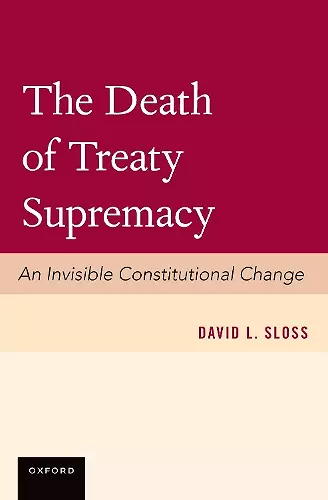The Death of Treaty Supremacy
Format:Paperback
Publisher:Oxford University Press Inc
Published:13th Dec '22
Should be back in stock very soon
This paperback is available in another edition too:
- Hardback£122.50(9780199364022)

This book provides the first detailed history of the Constitution's treaty supremacy rule. It describes a process of invisible constitutional change. The traditional supremacy rule provided that all treaties supersede conflicting state laws; it precluded state governments from violating U.S. treaty obligations. Before 1945, treaty supremacy and self-execution were independent doctrines. Supremacy governed the relationship between treaties and state law. Self-execution governed the division of power over treaty implementation between Congress and the President. In 1945, the U.S. ratified the UN Charter, which obligates nations to promote human rights "for all without distinction as to race." In 1950, a California court applied the Charter's human rights provisions and the traditional treaty supremacy rule to invalidate a state law that discriminated against Japanese nationals. The implications were shocking: the decision implied that the United States had effectively abrogated Jim Crow laws throughout the South by ratifying the UN Charter. In response, conservatives mobilized support for a constitutional amendment, known as the Bricker Amendment, to abolish the treaty supremacy rule. The amendment never passed, but Bricker's supporters achieved their goals through de facto constitutional change. The de facto Bricker Amendment created a novel exception to the treaty supremacy rule for non-self-executing (NSE) treaties. The exception permits state governments to violate NSE treaties without authorization from the federal political branches. The death of treaty supremacy has significant implications for U.S. foreign policy and for U.S. compliance with its treaty obligations.
[The Death of Treaty Supremacy] is necessary reading for all who study, practice or teach in the fields of international or foreign relations law or otherwise want or need to understand the role of treaties in the U.S. legal system. * David Stewart, Georgetown University Law Center, American Journal of International Law *
The 1783 Peace Treaty was the foundation stone of the nation, which is why the U.S. Constitution commands that treaties 'shall be the supreme law of the Land,' co-equal to the Constitution and Congress's laws. In this book, David Sloss shows how, after World War II, American conservatives' hostility to human rights treaties undermined and then neutered the constitutional command of treaty supremacy. Sloss' account of this constitutional mutiny is powerful, thought-provoking, and timely." -Thomas H. Lee, Leitner Family Professor of International Law, Fordham University Law School
The Death of Treaty Supremacy makes a major contribution to our understanding of American constitutionalism. It demonstrates the evolutionary nature of constitutional law, identifies the complex practical forces that drive its evolution, and highlights yet another flaw in constitutional 'originalism.' It shows that historical changes have transformed the Constitution's meaning even on an issue where the 'original' meaning was actually clear and specific * that properly ratified treaties are 'supreme' over state law." -Edward A. Purcell Jr., Joseph Solomon Distinguished Professor of Law, New York Law School *
In The Death of Treaty Supremacy, one of the nation's foremost treaty law scholars tells a story of interest to all who care about constitutional change. It's a story of constitutional change driven by political and legal elites rather than courts, largely unnoticed even among the wider legal community, yet with significant implications for U.S. foreign relations law. The book is a fascinating contribution to not just treaty law, but to constitutional law as a whole." -Michael D. Ramsey, Hugh and Hazel Darling Foundation Professor of Law, University of San Diego School of Law
David Sloss has written a fascinating case study on a central constitutional queýstion - how does the interpretation of the constitution change? Moreover, Sloss has taken as his example a pressing issue of contemporary constitutional debate- the role of treaties as domestic law in state and federal courts. His fine-grained and wide-reaching research and his thoughtful analysis benefits us all." -Judith Resnik, Arthur Liman Professor of Law, Yale University Law School
A superior study, deservedly awarded the Certificate of Merit in Creative Scholarship by the American Society of International Law in 2017." - Jus Gentium
ISBN: 9780197651797
Dimensions: 153mm x 237mm x 30mm
Weight: 712g
480 pages